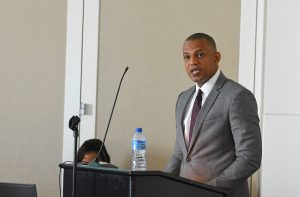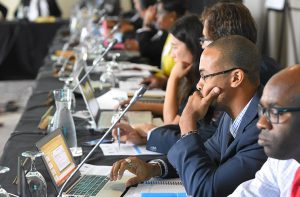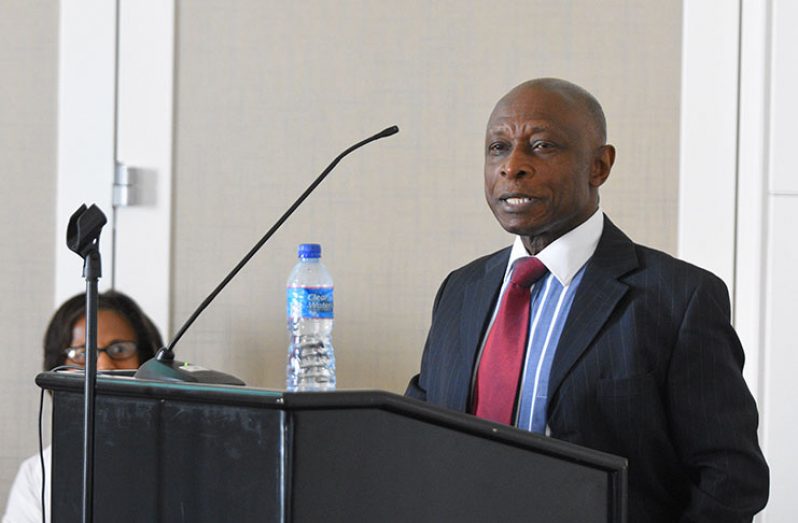…CDB bemoans sloth in implementing trade facilitation agenda
The Caribbean Development Bank (CDB) has challenged CARICOM Member States to implement their trade facilitation agenda, stating that for far too long regional competitiveness is being stymied due to poor implementation.
In his address to regional leaders during the opening session of the Regional Dialogue on the CARICOM Strategy for Regional Implementation of the World Trade Organisation (WTO) Trade Facilitation Agreement (TFA) at the Guyana Marriott on Wednesday, CDB Projects Department Director, Daniel Best said after years of signing the Revised Treaty of Chaguaramas, there are still a number of stumbling blocks hindering inter-regional trade.
“Seventeen years after signing the Revised Treaty of Chaguaramas regional competitiveness continues to be stymied by the relatively flat performance of inter-regional trade,” Best said.

He noted that the “flat performance” is as a result of the slothfulness in the implementation of the region’s trade facilitation agenda which spans beyond typical border issues which the WTO Trade Facilitation Agreement seeks to address.
“Behind the border issues encompass the regulatory and policy environment that impacts market access. Here I am speaking about things such as access to testing and accreditation services and the ability of our traders to meet mandatory standards,” the CDB Projects Department Director explained. These issues, he posited, impact the region’s ability to attract much needed investment.
However, cognizant of the evolving nature of the trade facilitation agenda, Best said the CDB has prioritized issuing of regional loans and grants to finance initiatives which reflect a regional approach to implementing global reforms, such as those employed by the WTO Trade Facilitation Agreement.
In Guyana, the Guyanese Government has taken a number of steps to facilitate easier trade.
The country ratified the WTO Trade Facilitation Agreement on November 30, 2015 and established a National Committee on Trade Facilitation (NCFT) on April 9, 2015 to oversee its implementation. That committee is jointly coordinated by the Foreign Affairs Ministry and the Guyana Revenue Authority and includes representation from other relevant border and trade-related agencies. Vice President and Minister of Foreign Affairs, Carl Greenidge said Guyana has taken appropriate steps to modernise its customs administration which in effect promote trade facilitation.
“As part of a strategy to further facilitate improvements to our trade performance and to create an enabling environment for doing business in Guyana, Government is moving forward with plans to conceptualise and develop a road map for an electronic single window in partnership with Inter-American Development Bank (IDB) with inputs from key stakeholders,” Minister Greenidge informed those present.
He said the strategy is aligned with international best practices and commitments under the WTO Trade Facilitation Agreement.
Based on Guyana’s experience, Minister Greenidge put forward three essentials for effective implementation.
An active national committee to secure needed inter-agency collaboration and harness institutional knowledge and technical experience; strong policy coordination and focal point leadership; Private Sector Support and Partnership are necessary, he said.
In 2013, the WTO successfully concluded negotiations on the Trade Facilitation Agreement at the Ninth Bali Ministerial. The agreement entered into force on February 22, 2017, following its ratification by two-thirds of the WTO membership.
The Trade Facilitation Agreement contains provisions for expediting the movement, release and clearance of goods, including those that are in transit. It also sets out measures for effective cooperation between customs and other appropriate authorities on trade facilitation and compliance issues. It further contains provisions for technical assistance and capacity building in this area.

Minister Greenidge pointed out that member states’ obligations include ratification of the agreement and notification of categories A, B and C commitment.
“For all member states that are yet to make these notifications – these steps are necessary to aid in the mobilization of donor support to implement the agreement. So I urge you to ensure that these commitments are honoured,” the Foreign Affairs Minister urged.
The regional dialogue seeks to address policy-related issues on trade facilitation in general and as they relate to implementation of the Trade Facilitation Agreement. The two day-session is intended to deepen the understanding and appreciation of participants for the regional approaches and priorities identified in the CARICOM Strategy for the region as approved by the Council for Trade and Economic Development (COTED). It is expected that at the end of the session, a road map would be developed to prioritize initiatives for implementation at the national and regional levels.
Islamic Development Bank (IsDB) Manager for Latin America and the Caribbean Region, Dr. Sobir Komilov, CARICOM Assistant Secretary General – Trade and Economic Integration Joseph Cox, and Minister within the Ministry of Finance, Jaipaul Sharma were among the other officials present during the opening session of the regional dialogue. .



.jpg)









